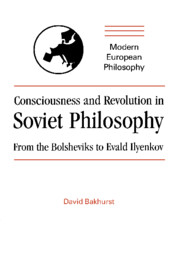Book contents
- Frontmatter
- Contents
- Acknowledgments
- A note on translation, transliteration, and references
- 1 Introduction
- 2 Deborinites, Mechanists, and Bolshevizers
- 3 Vygotsky
- 4 Lenin and the Leninist stage in Soviet philosophy
- 5 Ilyenkov and dialectical method
- 6 The problem of the ideal
- 7 The socially constituted individual: Rethinking thought
- 8 In conclusion
- References
- Index
4 - Lenin and the Leninist stage in Soviet philosophy
Published online by Cambridge University Press: 10 December 2009
- Frontmatter
- Contents
- Acknowledgments
- A note on translation, transliteration, and references
- 1 Introduction
- 2 Deborinites, Mechanists, and Bolshevizers
- 3 Vygotsky
- 4 Lenin and the Leninist stage in Soviet philosophy
- 5 Ilyenkov and dialectical method
- 6 The problem of the ideal
- 7 The socially constituted individual: Rethinking thought
- 8 In conclusion
- References
- Index
Summary
No account of what Ilyenkov inherited from the history of Soviet philosophy would be complete without a discussion of Lenin. Ilyenkov revered Lenin's work as a model of philosophical excellence, admiring especially his conviction that certain philosophical disputes were of such political significance that revolutionaries could not help but enter the philosophical arena. Indeed, Ilyenkov believed that the disputes in which Lenin himself had participated were by no means dead, but remained of considerable relevance to both philosophy and politics, and he thought of himself as taking up Lenin's cause (see Ilyenkov 1980: esp. 6–22).
In this chapter, I aim to appraise Lenin's approach to philosophy critically and to explore its place in Soviet philosophical culture, examining in particular its significance for Ilyenkov. Although Lenin's major philosophical works, Materialism and Empiriocriticism and the Philosophical Notebooks, were written before the 1917 Revolution, an important part of Lenin's role in the Soviet philosophical tradition was not formed until the 1930s, when the Bolshevizers – Stalin's new philosophical leadership – introduced the notion of a “Leninist stage in Soviet philosophy.” The idea that Marxist philosophy had entered this new stage remained a prominent theme throughout the Stalin era. As Ilyenkov was educated in this period, it is inviting to contrast the idea of the Leninist stage with Lenin's actual contribution, especially since Ilyenkov himself rebelled against the Stalinist orthodoxy by championing a position he thought authentically Leninist. I therefore begin this chapter by examining Lenin's place in the philosophy of the 1930s.
- Type
- Chapter
- Information
- Consciousness and Revolution in Soviet PhilosophyFrom the Bolsheviks to Evald Ilyenkov, pp. 91 - 134Publisher: Cambridge University PressPrint publication year: 1991

